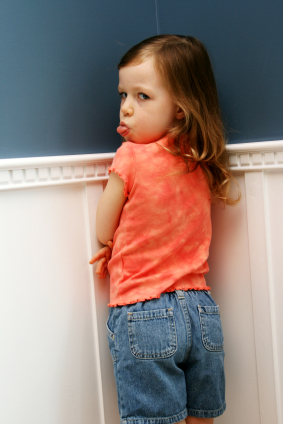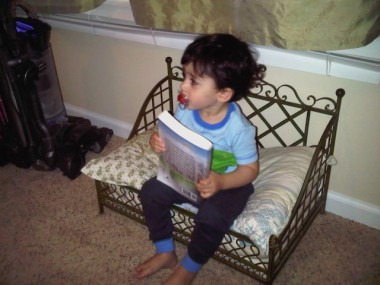
Talking to younger parents often reminds me of a parenting phenomenon that we experienced firsthand. Perhaps, if you’re children are older, you did also. It’s called the “terrible threes”.
Ever have a three year old try your patience?
As with so many others (most it seems), it’s not the “terrible twos” that is a problem — it’s the “terrible threes”.
It goes something like this: One day your precious angel — the one everyone thinks is so cute — who was hardly ever a problem before — suddenly becomes a living terror at times. You don’t know what to do — how to respond — and how to stop it.. You have never dealt with such temper tantrums, back-talking, and outbursts of anger.
If that’s your story — you may have entered the “terrible threes”.
Children cycle through many phases and it shouldn’t be too surprising if they go through a rebellious stage early in life. The terrible threes, or twos, as the case may be, most likely is the time when the child most openly expresses his or her independence.
And, the more independent the child — the more difficult this time can be. And, the longer it might last.
He or she is exploring a new world, testing boundaries, discovering their own personality, and filtering through reactions of others. As with other phases the child will experience, this one is difficult for the child as well as the parent, but in this phase the child is the least mature in the relationship and their reaction, by the way, should be likewise.
Here are 7 suggestions for surviving the terrible threes:
Suffer through it!
I know. That’s not what you wanted to hear, but most likely, it will not last long. Perhaps not even a whole year. And, there is hope on the other side — if you act wisely at this stage.
Be consistent
This is not the time to give in to the child’s outbursts. That almost never works. This is the time to consistently follow through with prescribed discipline. The child is learning. They need to learn that outbursts don’t work in your home.
And, why is this important? Well, you’re raising them to be an adult. Are similar outbursts usually okay in high school — or in the workplace?
Keep loving
As much as your child tries your patience, continue to always exhibit love to your child, even during discipline. Most likely they know when they are having a temper-tantrum. They are possibly even doing it for the attention it brings — wondering how you will react. Make sure they know and understand that even when you aren’t happy with their behavior — you will always love them.
Experiment
Use different discipline methods until you find one that works for this stage of the child’s life. Every child is unique. Some things work. Some things don’t. Again, you’re wiser at this point than them. Wisely experiment to find the right action to correct their action — or encourage better actions.
Remember you are the adult
Sometimes when the child is showing his or her worse side it is tempting to show yours. Don’t do it. Keep your cool. Be mature. Handle these days firmly, but calmly. Remember you are modeling behavior for your child. They are watching you — closely.
Teach your child
This phase can be a great opportunity to teach your child how to respond to disappointment and frustration — what an appropriate emotional response looks like. They’ll need that the rest of their life.
Don’t be afraid to share your situation with others
Often parents are embarrassed because of their children’s behavior during this stage of life. Grocery store visits can be embarrassing. Restaurant visits may be avoided. So, the parents hide the struggle. They falsely assume other parents don’t experience the same with their children. That’s a myth. The biggest surprise at this stage of your child’s life may be when you discover you are not unique in this struggle. Ask for help. Find a mentoring couple. That’s helpful at every stage of your child’s life — but especially at this one.
By the way, most of these are good suggestions in other phases of a child’s life also.
But, here’s a bonus one.
Enjoy!
Seriously, enjoy every season of your child’s life. They pass so quickly and each one has its own set of challenges. (And, it’s true, the challenges do get bigger — even into your child’s adulthood.)
The fact is that even the “terrible threes” can be filled with laughter and wonder as your child is becoming their own person. Zig Ziglar actually said to call them the “terrific two’s” (or threes). You sometimes get what you’re looking for in life. Marvel at what God has done and is doing in your child’s life. Even in the most difficult of seasons — children are a gift. A precious gift!
Praying for you parents! You’re probably doing better than it feels at times.





 Logging you in...
Logging you in...
 Loading IntenseDebate Comments...
Loading IntenseDebate Comments...
Our two year old becomes a three year old tomorrow. And he definitely started the "Terrible" somethings a few months back. The problem I have is that I find is outrageous behavior so adorable. I struggle not to laugh at either his over-the-top outbursts or his incorrect use of words during emotional outbursts.
I guess it's better to be assumed by their antics than infuriated.
Ha! Yes, that’s a problem. They can be very funny as they are developing their own little personality! Store them up — and laugh later — if you can!And, share them. We’ll laugh with you.
zig ziglar says when we get in touch with them "terrible twos" we are usually offering them recommendations on how to act. he indicates calling them "terrific twos" instead. when i suggested this to my sis she seemed pretty disappointed at me. oh well, at least we have this level to look forward to with gretchen.
We tried a method discussed on http://terribletwosthrees.org and that really worked like a charm!
Thanks
Good encouragement.
zig ziglar says when we call them "terrible twos" we are basically giving them instructions on how to act. he suggests calling them "terrific twos" instead. when i suggested this to my sister she looked pretty angry at me. oh well, at least we have this phase to look forward to with luke.
Yeah, Josh, I would agree with Zig on that one…if you are saying this to your kids. I consider this more “adult” conversation. I believe taking the positive approach to the whole parenting thing, by having a plan, staying positive, enduring the difficult days, etc., is a good way to parent. As I’ve said many times, when the children get older the bad times are harder to remember. You are going to be a great dad.
Thank you for this Ron. I have two 3yr olds and somedays I think they are going to drive me crazy. I am starting to notice some gray hairs. I keep telling myself, This too shall pass.
Just had this discussion with a friend of mine. Two’s are easy. 3 is the year they get creative and yup, can be terrible.
.-= Barry´s last blog ..E-mail, Etiquette, and Friends =-.
With Kassidy it was definitely terrible 3s! She woke up on her 3rd birthday a different child! I asked God to give me my sweet little girl back! She was fabulous at 2… go figure! We suffered through it though and she went back to being fabulous… of course now she’s getting close to being a terrible pre-teen! haha (Can that be your next series?!)
We suffered through it though and she went back to being fabulous… of course now she’s getting close to being a terrible pre-teen! haha (Can that be your next series?!)
Kameron… had a lot of autistic tendencies when he was little so he didn’t have “normal” terrible 2 behavior, but from about 18 months to age 4 was REALLY hard with him. He’s awesome now.
Kennedy of course is on her own schedule and own time line. She has moments of defiance, even now at 5 that I think, “Kassidy did that at 3!” But we’re also still recovering from her being treated with extra TLC from all her surgeries and maybe getting a little spoiled with that.
Keeghan is TWO. ALL TWO. Frank calls him Jekyll and Hyde! LOL One minute he’s sweet and cute and snuggling up to you, and the next… well… yes, I’m pretty sure “Terrible Two’s” was made just for him! HA! Thanks for this post! It was a good reminder that I’m not alone!
.-= Renee Garcia´s last blog ..Babies Babies Babies =-.